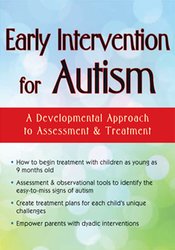

Early detection is critical to effective autism treatment… every moment counts.
But, at what age can you effectively identify autism and begin treatment? Do you know how to start treatment with very young children? Autism expert, Griffin Doyle, PhD, will show you the answers to these questions and more!
Looking through a developmental lens, you will learn new and improved strategies allowing you to effectively close the gap between what you know about autism and how to begin early treatment!
Through case examples, videos and lively class discussion you’ll be guided on how you can identify key markers of autism and begin treatment with children as young as 9 months old. You’ll get specific instruction so you can effectively intervene, prevent regression and promote developmental gains in young children – even prior to formal diagnosis.
In this recording, you'll learn the necessary skills you need to:
Don’t let a wait and see approach cost kids a better future. Intervene early when brain plasticity is much more pronounced and the impact of intervention is much more comprehensive!
You'll get the early identification and intervention skills you need to make a life-changing impact on children with autism!
This online program is worth 6.75 hours CPD.
| File type | File name | Number of pages | |
|---|---|---|---|
| Manual - Early Intervention for Autism (3.26 MB) | 44 Pages | Available after Purchase |
Griffin Doyle, PhD, is a licensed clinical psychologist with over 43 years of experience practicing psychoanalytic and developmentally-based psychotherapy with children and adults in private practice. Dr. Doyle has over 30 years of experience assessing and treating infants, toddlers and pre-school children “at-risk-for” or diagnosed with Autism Spectrum Disorder (ASD). He primarily works in a parent-mediated, developmentally-oriented treatment model popularly known as DIR/Floortime ©. This is a multi-dimensional framework that weaves together cognitive, social-emotional, relational, and innate constitutional factors as they interact uniquely in each child.
Dr. Doyle has worked and collaborated with a variety of specialists and reviewed studies aiming to capture the earliest signs and effective treatments for the youngest portion of the ASD population. He consistently lectures, trains and consults on “red flags”, subtle diagnostic cases, and the variability of symptom formation during early development (0-5 years). Dr. Doyle has found being face-to-face with each unique child and his/her caregiver provides a critical, compelling means to witness the child’s interests, communication style and capacity to engage. He coordinates ASD intervention with a team of occupational therapists, speech therapists, educators and pediatricians for the best possible outcomes. He often serves not only as a team member, but also as a case manager coordinating care to construct, execute, and refine treatment strategies.
Dr. Doyle has served as a core faculty member of various post-graduate training organizations. He is a co-founder, senior faculty, and training coordinator for the Profectum Foundation Training Programs. In this capacity, he teaches, mentors, and designs curriculum for a range of domestic and international professionals wishing to become proficient in practicing a comprehensive, relationship-based approach with pre-school up through college age ASD individuals.
Further, Dr. Doyle has advised widely at various public, private, and special educational settings, treatment centers, and a long-term research project promoting and studying development of ASD children. He testifies as an expert witness throughout Washington, DC and West Virginia regarding legal matters regarding treatment, custody, and divorce visitation with HFA children.
Speaker Disclosures:
Financial: Griffin Doyle is in private practice. She receives a speaking honorarium from PESI, Inc.
Non-financial: Griffin Doyle is a member of the American Psychological Association; and Maryland Psychological Association.
INTERVENTION STRATEGIES AND TECHNIQUES
Encourage Shared Play and Pleasure
Satisfaction Guarantee
Your satisfaction is our goal and our guarantee. Concerns should be addressed to info@pesi.co.uk or call 01235847393.
Please wait ...